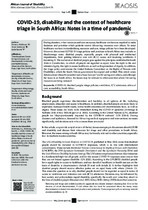| dc.contributor.author | McKinney, Emma Louise | |
| dc.contributor.author | McKinney, Victor | |
| dc.contributor.author | Swartz, Leslie | |
| dc.date.accessioned | 2020-11-23T09:14:33Z | |
| dc.date.available | 2020-11-23T09:14:33Z | |
| dc.date.issued | 2020 | |
| dc.identifier.citation | McKinney, E. L. et al. (2020). COVID-19, disability and the context of healthcare triage in South Africa: Notes in a time of pandemic . African Journal of Disability, 9,a766 | en_US |
| dc.identifier.issn | 2226-7220 | |
| dc.identifier.uri | 10.4102/ajod.v9i0.766 | |
| dc.identifier.uri | http://hdl.handle.net/10566/5456 | |
| dc.description.abstract | During disasters, when resources and care are scarce, healthcare workers are required to make decisions and prioritise which patients receive life-saving resources over others. To assist healthcare workers in standardising resources and care, triage policies have been developed. However, the current COVID-19 triage policies and practices in South Africa may exclude or disadvantage many disabled people, especially people with physical and intellectual impairments, from gaining intensive care unit (ICU) access and receiving ventilators if becoming ill. The exclusion of disabled people goes against the principles established in South Africa’s Constitution, in which all people are regarded as equal, have the right to life and inherent dignity, the right to access healthcare, as well as the protection of dignity. | en_US |
| dc.language.iso | en | en_US |
| dc.publisher | OpenJournals Publishing AOSIS (Pty) Ltd | en_US |
| dc.subject | COVID-19 | en_US |
| dc.subject | Disabled people | en_US |
| dc.subject | Triage policies | en_US |
| dc.subject | Ventilators | en_US |
| dc.subject | ICU admission | en_US |
| dc.title | COVID-19, disability and the context of healthcare triage in South Africa: Notes in a time of pandemic | en_US |
| dc.type | Article | en_US |

